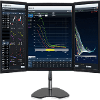Advertisement
Edit Your Comment
Do you know if there is a list
Mitglied seit Feb 22, 2011
4573 Posts
Dec 03, 2018 at 15:54
Mitglied seit Feb 22, 2011
4573 Posts
of brokers and the percentage of traders losing money with them?
I believe the average is about 75% but today I have seen ad for broker who advertise 86% of the traders is losing money with that broker :)
Isn't it appealing to join?
I believe the average is about 75% but today I have seen ad for broker who advertise 86% of the traders is losing money with that broker :)
Isn't it appealing to join?
Mitglied seit Feb 22, 2011
4573 Posts
Dec 04, 2018 at 11:27
Mitglied seit Feb 22, 2011
4573 Posts
Amancio posted:
I can't remember the location but I am sure that I saw something about this on an EU page related to the new ESMA regulation
https://www.forexfactory.com/showthread.php?t=800745
Dec 04, 2018 at 12:14
Mitglied seit Sep 29, 2016
255 Posts
ESMA has been a bit unfair as these numbers do not show the real picture behind the scenes.
They portray only the Retail trader statistics, so say in a brokerage there is 900 Clients that had €100 or less accounts and they lost their money (Highly likely scenario), and another 100 with larger Balances who have broken even/made a profit, by ESMA regulation the broker must state that 90% of traders lose money with this broker.
In another scenario a broker may have 100 professional Clients that are profitable, and only 100 or so retail traders that have lost their funds trading, this again would show that 100% traders lose money with this broker.
I believe other metrics such as Best Execution, Broker Capitalisation and reputation of broker are better gauges of broker reliability rather than the trader metrics that ESMA brokers have to show at the bottom of their websites.
They portray only the Retail trader statistics, so say in a brokerage there is 900 Clients that had €100 or less accounts and they lost their money (Highly likely scenario), and another 100 with larger Balances who have broken even/made a profit, by ESMA regulation the broker must state that 90% of traders lose money with this broker.
In another scenario a broker may have 100 professional Clients that are profitable, and only 100 or so retail traders that have lost their funds trading, this again would show that 100% traders lose money with this broker.
I believe other metrics such as Best Execution, Broker Capitalisation and reputation of broker are better gauges of broker reliability rather than the trader metrics that ESMA brokers have to show at the bottom of their websites.
ourmyfxbook@
Mitglied seit Feb 22, 2011
4573 Posts
Dec 04, 2018 at 12:20
Mitglied seit Feb 22, 2011
4573 Posts
L3CAP posted:
ESMA has been a bit unfair as these numbers do not show the real picture behind the scenes.
They portray only the Retail trader statistics, so say in a brokerage there is 900 Clients that had €100 or less accounts and they lost their money (Highly likely scenario), and another 100 with larger Balances who have broken even/made a profit, by ESMA regulation the broker must state that 90% of traders lose money with this broker.
In another scenario a broker may have 100 professional Clients that are profitable, and only 100 or so retail traders that have lost their funds trading, this again would show that 100% traders lose money with this broker.
I believe other metrics such as Best Execution, Broker Capitalisation and reputation of broker are better gauges of broker reliability rather than the trader metrics that ESMA brokers have to show at the bottom of their websites.
Even though you are right the number shown is very good indicator for retail trader. As I suppose the overall skill of traders is the same at ll brokers then the loss is caused by broker conditions not trader skills.
So theoretically you should be the most profitable with the broker with the lowest number of failing traders.
Dec 04, 2018 at 12:26
Mitglied seit Sep 29, 2016
255 Posts
But what about say a broker that accepts smaller deposits by retail traders? These accounts are likely to bust and give the broker a high losing score Vs a broker who may have a larger deposit requirements and their Clients are less likely to lose with bigger Balance (And the max 30:1 leverage).
Also the leverage cap is very recent and I believe after 1 year of having max leverage 30:1, it will be harder for retail Clients to lose their money, and subsequently the scoring of broker will probably improve.
Also the leverage cap is very recent and I believe after 1 year of having max leverage 30:1, it will be harder for retail Clients to lose their money, and subsequently the scoring of broker will probably improve.
ourmyfxbook@
Mitglied seit Feb 22, 2011
4573 Posts
Dec 04, 2018 at 12:29
Mitglied seit Feb 22, 2011
4573 Posts
L3CAP posted:
But what about say a broker that accepts smaller deposits by retail traders? These accounts are likely to bust and give the broker a high losing score Vs a broker who may have a larger deposit requirements and their Clients are less likely to lose with bigger Balance (And the max 30:1 leverage).
Also the leverage cap is very recent and I believe after 1 year of having max leverage 30:1, it will be harder for retail Clients to lose their money, and subsequently the scoring of broker will probably improve.
Well trading small account under 1k should bring the same risk/profit as big account.
That is all the matter of risk mgmt.
Dec 04, 2018 at 12:35
Mitglied seit Sep 29, 2016
255 Posts
togr posted:L3CAP posted:
But what about say a broker that accepts smaller deposits by retail traders? These accounts are likely to bust and give the broker a high losing score Vs a broker who may have a larger deposit requirements and their Clients are less likely to lose with bigger Balance (And the max 30:1 leverage).
Also the leverage cap is very recent and I believe after 1 year of having max leverage 30:1, it will be harder for retail Clients to lose their money, and subsequently the scoring of broker will probably improve.
Well trading small account under 1k should bring the same risk/profit as big account.
That is all the matter of risk mgmt.
Risk Management is another subject for discussion 😄 Maybe ESMA should have been issuing circulars and directives on that!
ourmyfxbook@
Mitglied seit Feb 22, 2011
4573 Posts
Dec 04, 2018 at 13:11
(bearbeitet Dec 04, 2018 at 13:11)
Mitglied seit Feb 22, 2011
4573 Posts
L3CAP posted:togr posted:L3CAP posted:
But what about say a broker that accepts smaller deposits by retail traders? These accounts are likely to bust and give the broker a high losing score Vs a broker who may have a larger deposit requirements and their Clients are less likely to lose with bigger Balance (And the max 30:1 leverage).
Also the leverage cap is very recent and I believe after 1 year of having max leverage 30:1, it will be harder for retail Clients to lose their money, and subsequently the scoring of broker will probably improve.
Well trading small account under 1k should bring the same risk/profit as big account.
That is all the matter of risk mgmt.
Risk Management is another subject for discussion 😄 Maybe ESMA should have been issuing circulars and directives on that!
Well they tried.
As with low leverage you cannot put big trades on small account.
So in order to get good profit you need either to deposit more thus risk more
or go offshore and risk it all :)
Mitglied seit Aug 27, 2017
875 Posts

*Kommerzielle Nutzung und Spam werden nicht toleriert und können zur Kündigung des Kontos führen.
Tipp: Wenn Sie ein Bild/eine Youtube-Url posten, wird diese automatisch in Ihren Beitrag eingebettet!
Tipp: Tippen Sie das @-Zeichen ein, um einen an dieser Diskussion teilnehmenden Benutzernamen automatisch zu vervollständigen.














